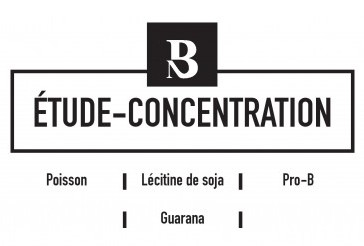For a more effective exam period...
Who says studies, also says exams. So how to best prepare for this often stressful step?
The workload before exams is often very heavy and the time spent studying often takes precedence over time spent sleeping. This is a serious mistake because during our sleep is when we memorize what we have learned previously.
Due to lack of time, the student pays even less attention to his diet and tends to snack and drink anything and everything during the day, and even at night. Sodas and other energy drinks are often the main allies of future graduates or those who fail at the end of their studies, which is of course a very bad idea...
A nutritional and micronutritional program with good general lifestyle habits -- I'm thinking here of sleep and regular physical activity -- should be offered to students of all types.
Here is the program that I propose for a day (note that this program is suitable for all students, from the youngest to the oldest)

UPON WAKING
A glass of warm water and the juice of a lemon with probiotics
+ a cross crawl exercise to properly coordinate the two cerebral hemispheres.
BREAKFAST
- One egg or two eggs with one or two fruits and some nuts or almonds (10 to 12 pieces). If you're not a fan of eggs, you can replace one with 30 grams of dried meat.
- Beverage: a green tea or a turmeric juice
Don't eat anything during the morning but regularly drink water, as well as green tea. Matcha tea is highly recommended.
MID-DAY MEAL
- Proteins: between 150 to 180 grams of meat (red meat twice a week) or fish – seafood – shellfish or cottage cheese or an omelette (once a week) or Tofu (once a week).
- Between 200 to 250 grams of vegetables and/or salads (no industrial sauces) and favor vegetables, particularly green vegetables and cruciferous ones (cabbage family).
- Starchy foods: no more than one portion (a portion = your own fist) of gluten-free starches, preferably lentils, quinoa, broad beans, chickpeas, polenta, potatoes and brown rice.
- Drink: ideally still water
- Oils: Important! Every day add two tablespoons of organic canola or walnut or flaxseed or camelina oil to your salad or vegetables.
- Dessert: if possible, no dessert or else 5 grams of dark chocolate with at least 70%.
SNACK (4:30 PM - 5 PM)
- A handful of oilseeds with a seasonal fruit and 20 gr of dark chocolate
- Drinks: a green tea
EVENING MEAL
- Prioritize white meats and all products that come from the sea, rich in lean proteins and good fats (about 120 to 150 gr). 3 times a week fish rich in omega 3 (sardines, mackerel, anchovies, herring, salmon...)
- Vegetables and salads (150 to 200 gr)
- Starches = a portion (one portion = one's own fist) of gluten-free starches, favoring lentils, quinoa, beans, chickpeas, polenta, potatoes, and brown rice.
- It is also possible to do without starchy foods and we can replace them with a red fruit salad for example.
But also:
Remember to chew properly and drink lots of water throughout the day, and to walk at least 45 minutes per day !
What micro-nutritional help?

I propose a micro nutrition package to support the brain during exam periods.
Here is what you can find there:
- Soy lecithin (memory)
- Guarana (energy)
- Probiotic (gut - second brain)
- Fish oil (heart - brain)
What other help for more efficiency?
For sleep and the brain, cardiac coherence (a method that allows you to learn to control your breathing in order to regulate stress and anxiety) is recommended daily. The application "Breath Relax" may prove useful.
I also advise to associate with relaxing music, rich in Delta or Theta waves, these should always be listened to with headphones.
With this, you will pass your exams as easy as pie...




